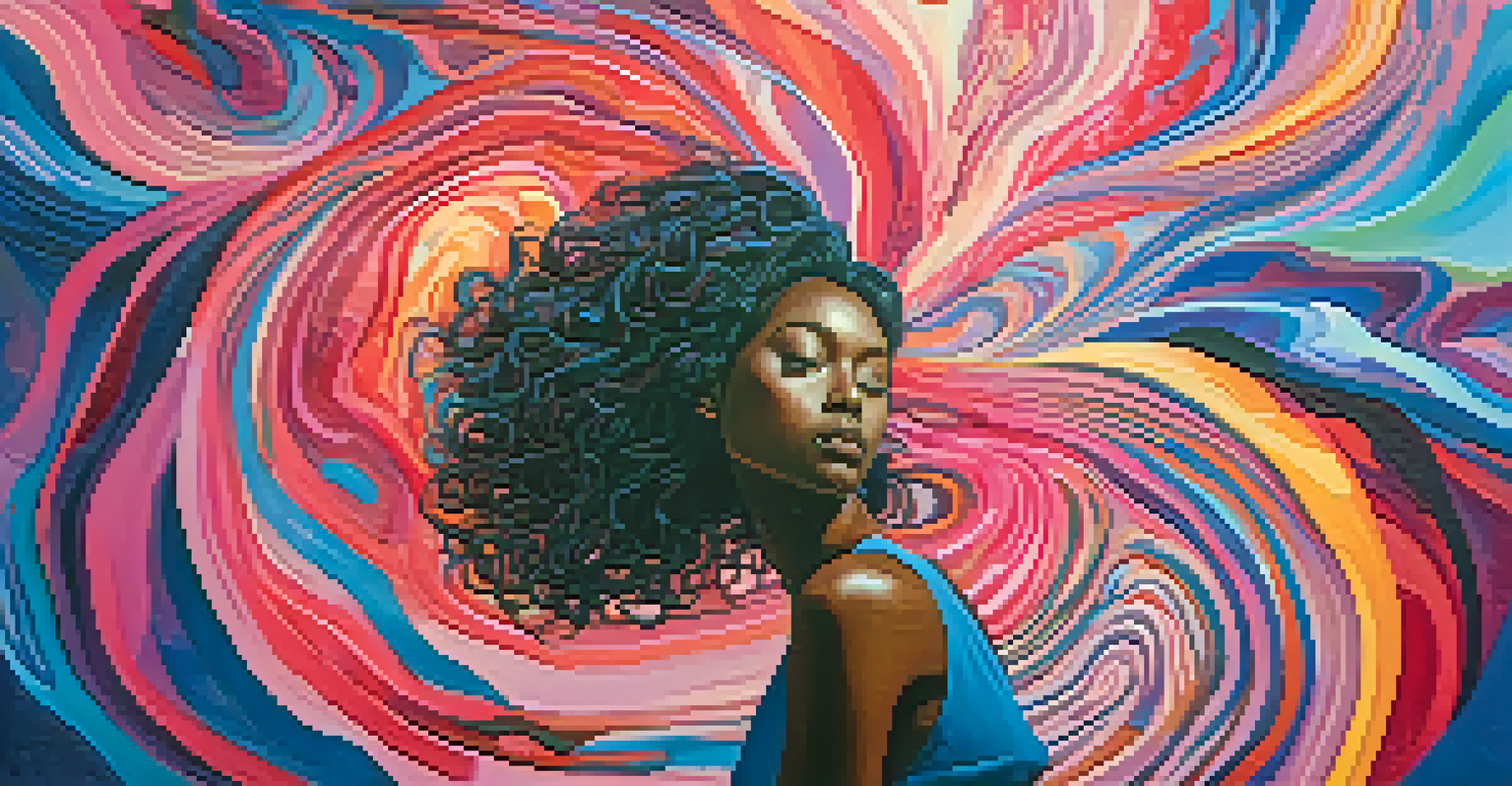Hallucinogens: Enhancing or Distorting Body Image Views?

Understanding Hallucinogens and Their Effects
Hallucinogens are substances that significantly alter perceptions, mood, and cognitive processes. Common examples include LSD, psilocybin mushrooms, and ayahuasca. These substances can affect the way individuals perceive themselves and their surroundings, leading to experiences that might enhance or distort reality.
The mind is everything. What you think you become.
When consumed, hallucinogens can trigger vivid visual and auditory hallucinations, which might lead users to experience their bodies differently. Some individuals report feeling a sense of unity with the world, while others may experience anxiety or feelings of disconnection. This duality raises intriguing questions about how such experiences influence body image.
It's essential to understand that the effects of hallucinogens can vary widely from person to person. Factors like dosage, setting, and individual psychology play a significant role. This variability suggests that hallucinogens could either enhance positive body image or exacerbate negative perceptions, depending on the user's mindset.
The Connection Between Body Image and Mental Health
Body image refers to the way individuals perceive their physical appearance, which can significantly impact mental health. A positive body image can lead to higher self-esteem, while a negative one may contribute to issues like anxiety and depression. Understanding this connection is crucial, especially when exploring the effects of hallucinogens.

Many people struggle with body image issues, often influenced by societal standards and media portrayals. When individuals use hallucinogens, they may confront these ingrained perceptions. Some might find liberation from societal pressures, while others may face intensified insecurities about their bodies.
Hallucinogens Alter Body Perception
Hallucinogens can significantly change how individuals perceive their bodies, leading to both positive and negative experiences.
This interplay highlights a critical aspect of hallucinogen use: the potential for introspection. Users may gain insights into their body image beliefs, leading to transformative experiences. However, these revelations can be a double-edged sword, as they might also unearth deeply rooted fears and anxieties.
Hallucinogens: A Tool for Self-Discovery?
Some individuals use hallucinogens as a means of self-exploration and personal growth. The altered state of consciousness can provide a fresh perspective on life, including one's body image. For many, this journey may lead to positive affirmations about their physical self and an appreciation for their uniqueness.
Reality is merely an illusion, albeit a very persistent one.
During these experiences, users often report feelings of connectedness to their bodies, fostering acceptance and love. This newfound appreciation can help combat negative self-perceptions, allowing individuals to embrace their bodies as they are. Such transformative experiences can lead to long-lasting changes in how one views themselves.
However, it's important to approach this tool with caution. The same substances that facilitate self-discovery can also provoke anxiety and exacerbate negative feelings. Therefore, while some may find clarity, others might struggle with challenging emotions that stem from their altered state.
Distortion of Body Image Through Hallucinogens
While hallucinogens can enhance body image for some, they can also distort perceptions for others. Users may experience heightened sensitivity to their physical appearance, leading to exaggerated feelings of inadequacy or discomfort. This distortion can manifest in various ways, from feeling detached from one’s body to perceiving it in unrealistic terms.
For instance, some users report feeling as if their bodies are changing shape or size, even if this isn’t the case. This altered perception can be distressing and may contribute to lasting negative body image issues. It underscores the importance of understanding the potential risks associated with hallucinogen use.
Body Image Influences Mental Health
A person's body image directly impacts their mental health, with positive body perceptions enhancing self-esteem and negative ones contributing to issues like anxiety.
Moreover, the experience of body distortion can be particularly challenging for those already dealing with body image concerns. These individuals might find that hallucinogens amplify their insecurities rather than alleviate them, creating a complex relationship between substance use and self-perception.
Cultural Perspectives on Hallucinogens and Body Image
Cultural attitudes toward hallucinogens vary significantly worldwide, influencing how they are perceived in relation to body image. In some cultures, hallucinogens are used in spiritual ceremonies, promoting body acceptance and unity with nature. Such practices can foster a positive body image, as individuals are encouraged to see themselves as part of a larger whole.
Conversely, in cultures where hallucinogens are stigmatized or viewed solely as recreational drugs, the conversation around body image can be quite different. In these contexts, individuals may approach their experiences with fear or guilt, which can further complicate their body image perceptions. This cultural lens is crucial in understanding the broader implications of hallucinogen use.
Ultimately, the cultural context shapes the experience of hallucinogens and their impact on body image. Understanding these dynamics can provide valuable insights into how different communities navigate their perceptions of self, beauty, and acceptance.
Research and Studies on Hallucinogens and Body Image
Research on the effects of hallucinogens on body image is still in its infancy, but emerging studies offer intriguing insights. Some studies suggest that hallucinogens can lead to increased openness and a more positive outlook on life, including body image. This potential for growth highlights the need for further exploration in this area.
However, it’s essential to note that not all studies yield positive outcomes. Some research indicates that hallucinogen use can exacerbate existing mental health issues, including body dysmorphia. This contradiction emphasizes the complexity of hallucinogens and their varied effects on individuals, depending on their mental health baseline.
Cultural Context Shapes Experiences
Cultural attitudes towards hallucinogens can greatly influence individuals' experiences and perceptions of their body image.
As research continues, it will be vital to approach findings with nuance. Understanding the diverse effects of hallucinogens on body image can help inform therapeutic practices and support individuals in navigating their experiences more effectively.
Conclusion: A Balanced View on Hallucinogens and Body Image
In conclusion, the relationship between hallucinogens and body image is multifaceted and deeply personal. While some individuals may find that these substances enhance their self-acceptance and body positivity, others may experience detrimental effects. This variability underscores the importance of a balanced perspective when considering hallucinogen use.
Ultimately, the impact of hallucinogens on body image is influenced by individual experiences, cultural contexts, and mental health backgrounds. Engaging with these substances should be approached thoughtfully, with an awareness of potential risks and benefits. This awareness can empower users to make informed choices that align with their personal journeys.

As society continues to explore the therapeutic potential of hallucinogens, understanding their impact on body image will be crucial. By fostering open conversations and conducting further research, we can begin to unravel the complexities of self-perception in the context of these powerful substances.